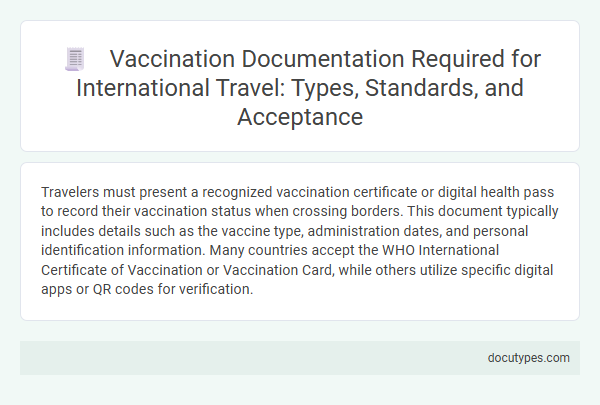Travelers must present a recognized vaccination certificate or digital health pass to record their vaccination status when crossing borders. This document typically includes details such as the vaccine type, administration dates, and personal identification information. Many countries accept the WHO International Certificate of Vaccination or Vaccination Card, while others utilize specific digital apps or QR codes for verification.
Importance of Vaccination Documentation for International Travelers
Vaccination documentation is essential for international travel to verify immunization against contagious diseases. This document helps streamline border crossing procedures and ensures compliance with health regulations.
- International Certificate of Vaccination or Prophylaxis (ICVP) - A standardized document issued by WHO-recognized health authorities to officially record vaccination status.
- Digital Vaccination Passports - Secure digital records accepted by many countries to prove vaccination status quickly and accurately.
- Importance for Border Control - Accurate vaccination records reduce quarantine requirements and support public health safety during travel.
Common Types of Vaccination Records Needed for Abroad Travel
| Type of Vaccination Document | Description | Common Use in International Travel |
|---|---|---|
| Yellow Card (International Certificate of Vaccination or Prophylaxis) | Official document issued by the World Health Organization (WHO) that records vaccinations for diseases like yellow fever. | Mandatory for entry into countries with yellow fever risk zones, especially in Africa and South America. |
| COVID-19 Vaccination Certificate | Digital or paper certificate showing proof of COVID-19 vaccination, often including vaccine type, dates, and doses. | Required by many countries to enter, allowing travelers to avoid quarantine or testing requirements. |
| Routine Immunization Records | Records of common vaccines such as measles, mumps, rubella (MMR), tetanus, diphtheria, and polio. | Important for countries with outbreaks or vaccination requirements for school or work visas. |
| Rabies Vaccination Certificate | Proof of rabies vaccination, typically required for travelers visiting high-risk areas or bringing pets. | Essential when entering countries with rabies control regulations or for travelers engaging in outdoor activities in endemic regions. |
| Hepatitis A and B Vaccination Records | Documentation of hepatitis A and B vaccinations, recommended for travel to countries with endemic hepatitis. | Advised for extended stays or visits to regions with elevated hepatitis risk, particularly in Asia, Africa, and the Middle East. |
WHO-Recognized Vaccination Certificates and Their Role
When crossing borders, a WHO-recognized vaccination certificate is the standard document required to record your vaccination status. This certificate verifies immunizations against diseases like COVID-19, facilitating smoother international travel.
WHO-recognized vaccination certificates serve as official proof of immunization, accepted by most countries to ensure public health safety. These documents include details such as the vaccine type, date of administration, and personal identification information. Presenting this certificate helps travelers comply with entry requirements and reduces the risk of quarantine or denial at borders.
Digital vs. Paper-Based Vaccine Documentation: Pros and Cons
Travelers crossing borders must present valid vaccination documentation, which can be either digital or paper-based. Digital vaccine certificates offer quick access, easy verification, and reduced risk of loss, enhancing convenience during travel. Paper-based records remain essential in regions with limited internet connectivity or for travelers who prefer physical proof, despite the risk of damage or misplacement.
Key Vaccines Required by Popular Destinations
When crossing borders, an International Certificate of Vaccination or Prophylaxis (ICVP) is the primary document required to record vaccination status. This official document is recognized by the World Health Organization and accepted by most countries to verify immunizations.
Key vaccines needed vary by destination. Popular travel spots like Africa and South America often require Yellow Fever vaccination, while countries in Asia may mandate Hepatitis A and B immunizations for entry.
International Health Regulations and Vaccine Record Standards
Crossing international borders requires specific documentation to verify vaccination status in accordance with the International Health Regulations (IHR). Standardized vaccine records ensure global recognition and facilitate safe travel amid health concerns.
- International Certificate of Vaccination or Prophylaxis (ICVP) - This document, also known as the Yellow Card, is issued under IHR guidelines to officially record vaccines required for entry into certain countries.
- WHO Standards - The World Health Organization establishes vaccine record formats and validation protocols to maintain uniformity across nations.
- Digital Vaccine Passports - Emerging digital solutions follow standardized criteria to securely display verified vaccination data acceptable at borders.
Your accurate and updated vaccine documentation aligned with these standards is mandatory for smooth entry through border control checkpoints.
How to Obtain and Authenticate Your Vaccination Documentation
When crossing borders, travelers need a recognized vaccination certificate, such as the International Certificate of Vaccination or Prophylaxis (ICVP), to record their vaccination status. To obtain this document, visit authorized healthcare providers or vaccination centers that issue official vaccination cards or digital certificates. Authentication involves ensuring the certificate includes a healthcare provider's name, vaccination details, and a valid QR code or official stamp to meet border control requirements.
Acceptance of Foreign Vaccination Records: Variability by Country
What type of document is required to record vaccination status when crossing international borders? Countries have varying requirements for the acceptance of foreign vaccination records. Some accept digital certificates like the WHO COVID-19 Vaccine Certificate, while others require official government-issued paper documents.
Addressing Issues with Lost or Incomplete Vaccination Documents
When crossing borders, a recognized COVID-19 vaccination certificate or digital health pass is required to record vaccination status. Commonly accepted documents include the WHO's International Certificate of Vaccination or country-specific digital apps like the EU Digital COVID Certificate.
If vaccination documents are lost or incomplete, travelers should contact their healthcare provider or local health authorities to request replacement records. Some countries accept digital proof from official vaccination databases or may offer on-site verification to avoid travel disruptions.
What Type of Document Is Needed to Record Vaccination Status When Crossing Borders? Infographic

